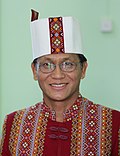| |||||
| Decades: | |||||
|---|---|---|---|---|---|
| See also: | |||||
This is the list of important events happened in Myanmar in 2024.
| |||||
| Decades: | |||||
|---|---|---|---|---|---|
| See also: | |||||
This is the list of important events happened in Myanmar in 2024.
| Photo | Post | Name |
|---|---|---|
 | Acting President | Min Aung Hlaing (acting president, since 22 July) |
| Chairman of the State Administration Council Prime Minister | ||
 | Vice Chairman of the State Administration Council Deputy Prime Minister | Soe Win |
| First Vice President | Myint Swe (acting president, until 22 July) | |
 | Second Vice President | Henry Van Thio (until 22 April) |
 | Deputy Prime Minister | Mya Tun Oo |
 | Deputy Prime Minister | Tin Aung San |
 | Deputy Prime Minister | Win Shein |
Source: [74]
{{cite web}}: CS1 maint: multiple names: authors list (link)